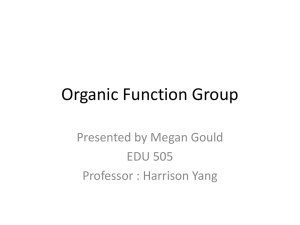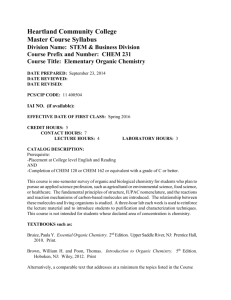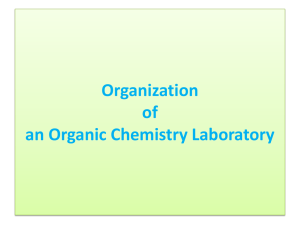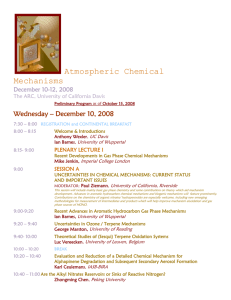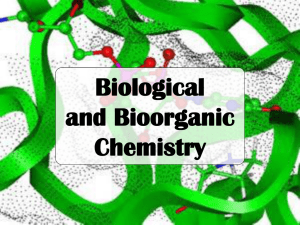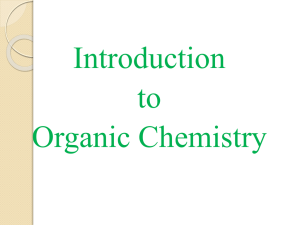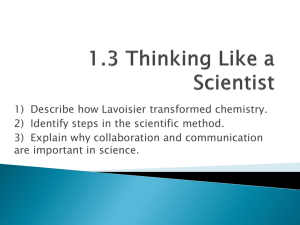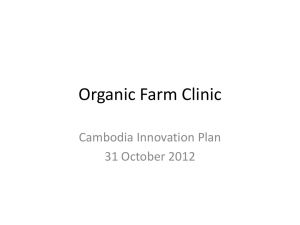Organic Chemistry II Introduction
advertisement
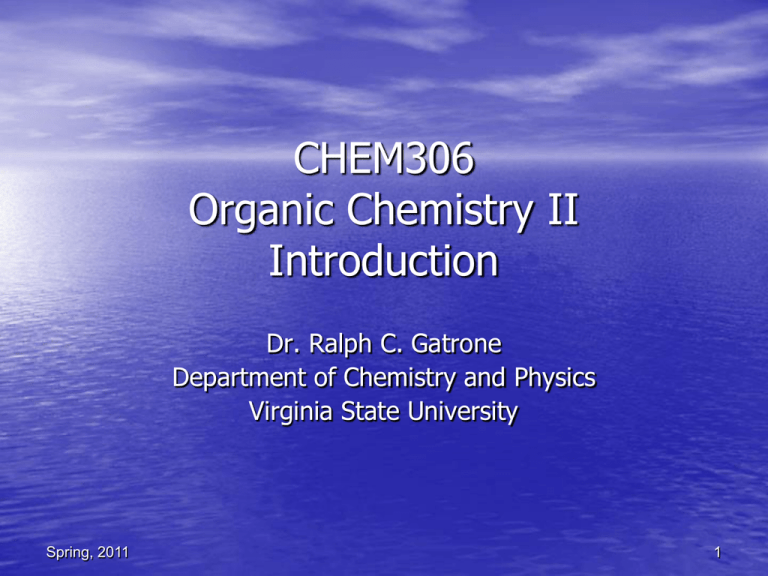
CHEM306 Organic Chemistry II Introduction Dr. Ralph C. Gatrone Department of Chemistry and Physics Virginia State University Spring, 2011 1 Organic Chemistry II CHEM306-01-102 • Office Hours • • • – T: 9:30 – 11 and 1:00 – 4:00 – by appointment (524-5762) Office: HM239Nb Email: rgatrone@vsu.edu I will not respond to an email address that does not end in @vsu.edu Spring, 2011 2 CHEM306 Organic Chemistry II Course Description • • • • • • Survey of compounds composed of carbon Nomenclature Structure Physical properties Reactions Mechanisms Spring, 2011 3 Course Emphasis • Spectroscopy • Organic reactions • Molecular orbital theory • Organic Mechanisms • Molecules of biological importance • Critical thinking skills • Skills necessary to do well on – MCAT, PCAT, OAT, DAT Spring, 2011 4 Questions We Will Consider • Why do certain reactions occur? • Why do others not occur? • What drives or does not drive these • • • processes? Why do these molecules have certain properties? Can we predict the presence or absence of certain properties? Can we make new materials with properties we desire? Spring, 2011 5 Requirements and Prerequisites • Course Materials • Text: Organic Chemistry: A Biological Approach 2e, John McMurry • Prerequisites – CHEM305 – Associated Laboratory • • • • • • Functional Groups Quantum mechanics Kinetics and Thermodynamics Acid Base Chemistry All material covered in Chapters 1 through 12 not including 10 and 11 Spring, 2011 6 Homework • Every problem in the Text is assigned. • However, – They will not be graded. – They will not be collected. – They will not be discussed in class. – They are available to you to determine if you understand the material. Spring, 2011 7 Evaluation • Test 1: Chapters 1 – 11 • Test 2: Chapters 1 – 13 • Test 3: Chapters 1 – 16 • Final Exam Chapters 1 – 17 • Total Points Possible Spring, 2011 100pts 100pts 100 pts 200pts 500pts 8 Evaluation – Grade Calculation • Final Grades will be computed: – Earned Points >450 400 – 449 325 – 399 250 – 324 <249 Spring, 2011 Final Grade A B C D F 9 Important Note • If you withdraw from the lecture • You MUST withdraw from the laboratory. Spring, 2011 10 Extra Credit • One extra credit test will be given. – January 18th – Same as the Final Exam from CHEM305 – Valued at 100 points. • No additional extra credit will be provided. • No extra assignments to improve your grade will be considered. Spring, 2011 11 Special Consideration • • • • • • • • • • • • • Grade are earned. Grades are not awarded Grades cannot be negotiated. Grades cannot be influenced by factors such as: I like you You like me (rare circumstance) I feel sorry for you You are a nice person in good standing with the university. You will lose a scholarship You will forfeit some tuition reimbursement A previously excellent GPA will be ruined You will be sent back to a repressive country You will not graduate on time! Spring, 2011 12 An Additional Word on Special Consideration • Do not call me after the semester is over asking if there is anything that you or I can do to assist you in passing this class! • We have approximately 14 weeks between today and the day I submit grades in May. • Take advantage of every moment available. Spring, 2011 13 A Special Note on Graduation • Graduating from VSU requires that the student – complete a minimum of 120 semester hours of credit – have a minimum cumulative GPA of 2.00 or better – complete the general education requirements – meet the major requirements of the curriculum leading to the degree – spend the last 27 hours in resident study Spring, 2011 14 A special Note on Graduation • All of these are student responsibilities • NOT of the faculty • If this course is required for you to graduate, take this requirement seriously • I will not assist you in meeting your responsibilities. Spring, 2011 15 Attendance • • • • • • Assumption: you are adult students Attendance in lecture is expected Attendance at tests is required. A missed exam will receive a grade of zero. No excuses will be accepted. A missed final exam will receive a zero. • Incompletes are rarely and reluctantly given. They are generally proceeded by death or other serious illness. Spring, 2011 16 A Word on Examinations • Examination format will consist of short answer questions similar to those in the text. • The final examination will consist of 100 multiple choice questions similar to those used on the MCAT, PCAT, etc. Spring, 2011 17 A Word on the Final Exam • The final exam is scheduled for May on a day selected by the university. • This is scheduled by the university to minimize conflicts between rooms and courses. • If this is an inconvenient time for you, please withdraw from the course today. • There is no excuse that I will accept that would permit you take the exam early. Spring, 2011 18 Cell Phones • During my class you should • Turn your cell phone off. • Turn your desire to communicate with anyone but me off. • I am the only professor in the room. Spring, 2011 19 Expectations • • • • • • • • A professional student is expected to attend classes purchase course materials study do the homework be prepared for class be prepared for tests do well Spring, 2011 20 Expectations • Faculty members are expected to • attend class • prepare lecture materials • present lecture materials • prepare and grade tests and quizzes • be available for outside consultation • keep accurate records Spring, 2011 21 Important Note • Faculty members are not expected to • Provide extra credit • Negotiate grades • I do not work for the US State Department or the United Nations. I do not negotiate. Spring, 2011 22 Doing Well • • • • • • • • • • Read the chapter before lecture Attend lecture Take notes Do not rely on copies of Power Points Re-read the chapter after lecture Review lecture notes daily Rewriting the lecture notes is strongly suggested Keep, maintain, and study note cards Learn the functional groups Do homework problems. Spring, 2011 23 Is this the only course I am taking? • • • • • • • • • As far as I am concerned – YES Time invested = Desired grade Average professional – 60 hours/week Professional student ~18 hours/week in class 60 – 18 = 42 42hours/6 days = 7 hours per day Or approximately 2 hours/class Time invested = Desired grade Spring, 2011 24 Why? • Your Role: • The job of understanding the material is yours. • • • • • My Role: Guide I’ve been here. I’ve done it. I have the t-shirt. • Best advice I can give you: • If you choose to study organic chemistry like other courses you have taken you might do well, but the odds are against it. Spring, 2011 25 What is the minimum I need to do to get out of here? • Depends, what grade do you want? • W, F, or D – Attend class irregularly – Study just before each test – Rely upon your memory • C, B, or A – – – – – – – Never miss class Read the chapter before and after class Review lecture notes daily Study 2 hours per day, 6 days per week Make and use note cards Do all assigned homework problems See me for assistance early and often Spring, 2011 26 Why Study Organic Chemistry? • • • • • • • • • • Required for Major I will never need it. Required for Major I might need it someday. Elective I will certainly never need it. Best course on campus. Best instructor on campus Only class available at this forsaken time Need to lower my GPA. Spring, 2011 27 Important Questions • Is drop/add over? • Are there any other instructors available? • When is the last day to withdraw? • What is the minimum I need to pass? • What is organic chemistry? Spring, 2011 28 Review of Organic Chemistry I • Up to this point Organic Chemistry I covered – – – – – – – – structure, bonding, acids and bases alkanes, cycloalkanes, nomenclature, stereochemistry, alkane conformational analysis organic reactions, thermodynamics, kinetics alkenes, nomenclature, structure and reactivity alkynes – nomenclature, structure and reactivity alkyl halides – structure and reactivity stereochemistry of chiral molecules • Assumptions for Organic Chemistry II – You studied this material in Organic Chemistry I – You received an A in Organic Chemistry I • Our Review of Organic I is complete! Spring, 2011 29

